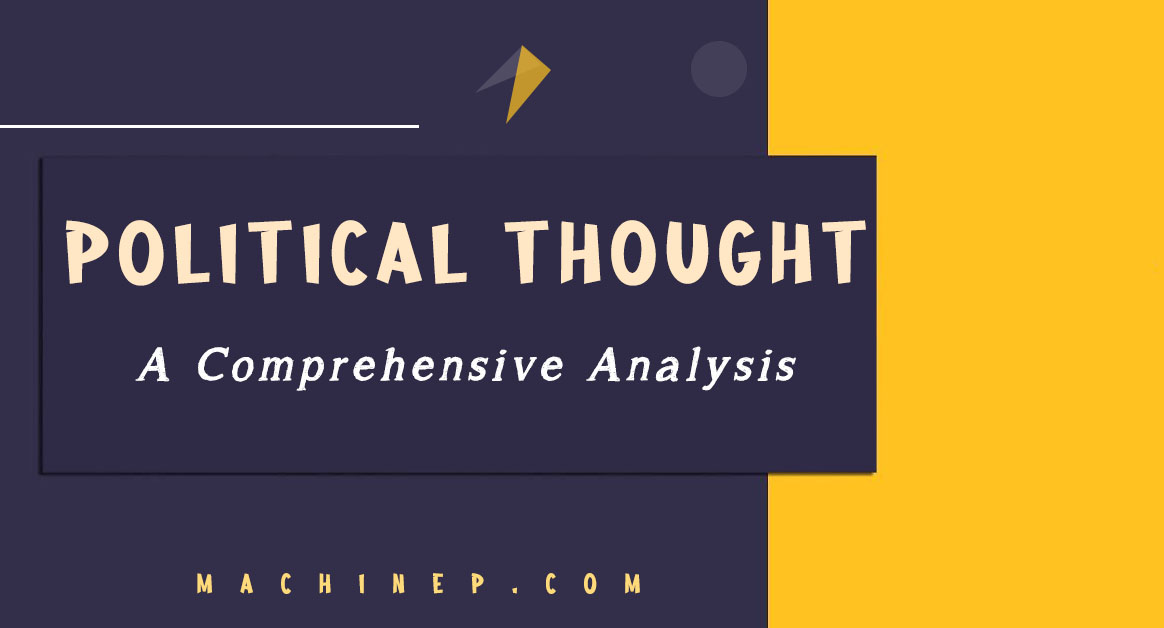Political Thought – Nature, History and Characteristics
Political thought can simply be defined as thinking. Many people define political thought as “a disciplined investigation of political problems, while some others define political thought as a systematic thinking about the purpose of government. Political thought is nothing but thought about the state, what it means, its nature and structure, its purpose and function. The raison deters how best it should be organized and administered.
Nature of Political Thought
Political thought came up through deduction and induction. Deduction can be seen as value judgment, idealistic and speculative imagination. It reflects a way of thinking or attitude of a people. The goal of deductive political thought is to lay down values, standards to which all political institutions practices should conform.
Induction is empirical in the sense that thoughts about politics were scanty and lacking in articulation. They existed in the form of proverbs songs and idiom. Political thought is descriptive when it attempts an analysis of the existing political system. It is also prescriptive when it advocates specific forms of political action.
Classification of History of Political Thought
The classification of the history of political thought is based on the following historical periods.
1. The Political Thought of the Ancient World:
This studies the political ideas and values of the ancient political civilization of the classical era. The thinkers and philosophers of this period are the sophists, Socrates, Plato, Aristotle, the Hellenic and Hellenistic philosophical schools.
2. The Medieval Political Thought
This studies the political ideas, theories, and values of the early Christian times. Thinkers in this medieval era are St. Augustine (354AD – 430AD) and St. Thomas Aquinas (1225AD – 1274AD).
3. The Political Thought of the Renaissance Period
This was a period of rebirth of the human spirited-dawned in the 14th Century. Nicollo Machiavelli (1469 – 1627) was the thinker at the center stage of this political era.
4. The Political Thought of the Post-Renaissance Era
The theory of social contract become significant in this period. Two forms of theory are found in the era which are, the government contract and the social contract proper. The social contract theorists are Thomas Hobbes (1588 – 1619), John Locke (1632 – 1704), and Jean Jacques Rousseau (1712 – 1778).
5. The Enlightenment Period
These are the contemporary political thinkers which include Edmund Burke, Jeremy Bentham, J. S. Mill, Frederich George Hegel, Karl Marx, etc.
The Significance of Political Thought
- The history of political thought enables us to study the writings of great thinkers who have exercised great influence on the human mind through different periods of history.
- It teaches us to understand socio-political change, the evolution of political institutions and ideas, and the shaping of various structures of political society.
- It enables us to understand the political civilizations and their contributions to the origin and growth of civil society.
- It helps to solve present-day political problems by looking for ideas that solved similar problems in the past.
The Genesis of Political Thought
Political thought started as soon as the man came together to live, as social animals. It was during the time of the ancient Greeks that systematized thinking about politics began. It was among the ancient Greeks that we got the first group of people who devoted time to reflect on the basic issue of the state, that posed fundamental questions and gave answers about man and his relationship with the state. It was the ancient Greek that produced Socrates, Plato, and Aristotle.
The Greek Society: The Characteristics of the Greeks
The Greeks lived in small cities called polis – a city possessing common habits, military strength, a myth of its origins, its own god and religion, and citizens. It was not by accident that the Greeks became the authors and originators of political philosophy. They became great thinkers and philosophers because they were very curious people, they were seekers after unknown truths.
The Greeks also had great faith in reason, they had a great instinct for criticism of everything including themselves. The Greeks were also great humanities to crown the Greek attributes was the polis, their unique political organization.
The Contribution of the Greek in the Development of Political Thought
- The capacity to reason and understanding nature.
- The Greeks created both civic politics and political freedom.
- The Greek Democratic Experience was the emergence of political thought.
- A humanistic attitude towards life.






Bunch of interesting points!